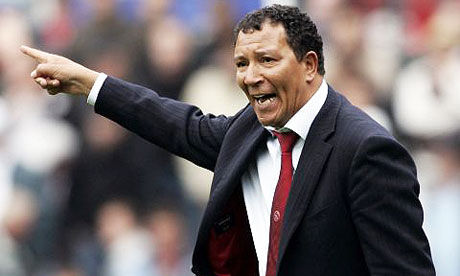Shandong Luneng has reached an agreement with Dutchman Henk ten Cate to take over as the club’s manager for the upcoming season. Ten Cate has had a very nomadic career, coaching at a number of different clubs, mostly in Holland, as well as spells as an assistant with Chelsea and Barcelona. Shandong was linked to a number of individuals during their managerial search, including Sven-Goran Eriksson, but Ten Cate looks to be an excellent choice who will be capable of whipping the club into shape and once again turning them into a contender, after a tough 2011 season.
The hiring of Ten Cate is part of a trend this winter, as Chinese teams increasingly turn to non-Chinese managers. The past few months have seen a wave of foreign hirings, with Jean Tigana (Shanghai), Sergio Farias (Guangzhou Fuli), Jan Versleijen (Henan), Chang Woe-Ryong (Dalian Aerbin), and Takeshi Okada (Hangzhou) all come to the Chinese Super League.
At the start of the 2011 season, 5 of the 16 clubs had Chinese managers, with the hiring of Tigana and Okada, two clubs who were formerly managed by Chinese coaches now have foreigners leading the side. On top of that, Fuli formerly had a Chinese manager and also switched to a foreigner as they tackle the challenge of the Chinese Super League. Right now, only Tianjin and Qingdao are without managers and both clubs appear to be looking mainly at foreign options. Looking at the J-League, the majority of managers are Japanese, while every K-League manager is Korean.
Despite Ma Lin winning manager of the year in 2011 and the adjustment it takes having a foreigner who may not have coached in Asia (let alone China) before, clubs still seem to be jumping at the chance to hire foreigners over locals. Gao Hongbo’s late season hiring by Shaanxi was the only Chinese reversal where a local took over for a foreigner. Some of the top Chinese managers like Wu Jingui, Pei Encai, Li Shubin, and Zhu Guanghu are not coaching in the top flight, a few of them out of jobs entirely. At the same time, the next generation of Chinese managers, mostly retired internationals, are still not ready for primetime, as Li Xiaopeng’s experience with the women’s Olympic side showed.
The lack of Chinese managers in the top league isn’t necessarily good or bad, it just is. It’s a sign of an unhealthy domestic game, but I don’t think it comes as a surprise to anybody that Chinese football has its problems. Foreign managers bring in different experiences and techniques which can help the development of young players, the next best thing to a player going abroad in the best of circumstances.
I am leaning towards thinking that this year only having three Chinese managers is just an outlier and that next year it will be back closer to half, especially since its unusual for a promoted team to go after a foreign manager. Some of these new arrivals are sure to not be around when the 2012 season comes to a close and as clubs see that a foreign manager is not necessarily the answer, we will see more Chinese managers getting opportunities.

